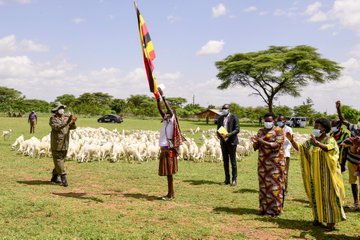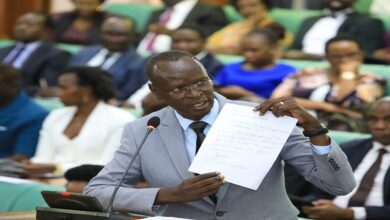KARAMOJA: Before iron sheets scandal settles, OPM serves Ugandans the goats’ scandal
Barely a year passes by without a scandal involving billions of shilling emerging from that office, no matter who is the Prime Minister.

The Office of the Prime Minister has over the years been the homebed of corruption and national resources utilization scandals. Barely a year passes by without a scandal involving billions of shilling emerging from that office, no matter who is the Prime Minister.
The latest scandal to emerge from the OPM office has been the iron sheets scandal propagated by the minister of Karamoja Mary Kitutu, but before it settles down, another has emerged.
Daily Monitor has Monday reported that a Shs25 billion tender in 2021 to supply goats to vulnerable households has been squandered by the vultures in the OPM office headed by Prime Minister Robinah Nabbanja.
The newspaper reports that on top of buying less goats than those budgeted for, those that were bought for distribution were sick and died during or after being handed over to the beneficiaries.
Also, the newspaper through sources reveals that the suppliers of the goats are relatives of powerful individuals and politicians at OPM.
Quoting David Amonding, a community development officer in Kotido, reports that some of the goats died of Peste des petits ruminants (PPR), a highly contagious transboundary viral disease of sheep and goats associated with high mortality.
Amonding told the newspaper that some beneficiaries sold the goats because of hunger while some goats were stolen by cattle thieves. “The main challenge that we saw, most of the goats from Teso had PPR. Most of [the beneficiaries] lost those goats that came from Teso, there is a farmer here in my community, out of 11 goats, he lost 10 goats and remains with only one goat, which is a Galla [breed].”
Clinically, the disease resembles rinderpest (RP) in cattle and is characterized by high fever conjunctivitis and oculo-nasal discharges, among other symptoms.
The other goats that were supplied includes the Boer, a muscled South African breed bred mainly for meat. But most of the Boer goats could not escape the terrain in Karamoja.
“Most of those that died were Boer goats. Most of the sub-counties received the goats. Other goats died at the quarantine where veterinary doctors treated them, goats died in hands of farmers and veterinary officers giving the impression that these goats were already infected with PPR, most of the goats died within two weeks. Farmers quickly sold the remaining goats when they realised they were dying,” Amoding said.
Jie County Member of Parliament (MP) Peter Abrahams Lokii said most of the goats were meant to be purchased from Karamoja to support the local economy.
“We have had as members of Parliament to ask for support from government and a supplementary [budget] of Shs39b was approved … to support disarmament by supporting identified beneficiaries. We have had a problem with the intervention,” he said, adding: “Not all beneficiaries have received the goats and nobody is explaining to us when they will receive what has not been received. One year down the road, I don’t think the Shs39 billion is there; so, if it’s not there where are the goats?.’’
Kotido Municipality counterpart, Mr Ismail Muhammad Lomwar, said the goat deal was a scam and the animals were procured at inflated prices.
“The cost of the goats was inflated at Shs500,000 to Shs800,000. A goat in Karamoja can cost between Shs100,000 and Shs150,000, the information was hidden from us, the leaders. The supply became a scam, the goats which were supplied most of them died,” he said.
Read full DAILY MONITOR report HERE






